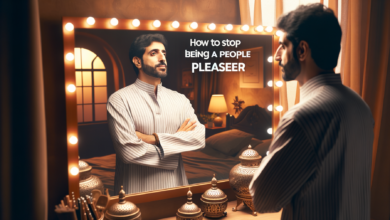Breaking Free from the Cycle of Comparison

Do You Find Yourself Constantly Measuring Up to Others?
It’s a common situation, being caught up in the relentless cycle of comparison. If you’ve ever glanced at your friend’s new car, peeked at a colleague’s promotion update on LinkedIn, or scrolled through countless perfection-portrayed posts on Instagram only to feel a bit less about your own achievements, you’re far from alone.
Comparing ourselves to others seems almost like a natural instinct—something as automatic as breathing. However, the constant comparison is not just mentally exhausting; it can lead to unhappiness and prevent us from focusing on our self-improvement. Breaking free from the cycle of comparison is essential for personal growth and happiness. Let’s explore how to navigate away from comparison and focus on what truly matters.
Understanding Why We Compare Ourselves to Others
The habit of comparison is deeply ingrained in human psychology. We compare for various reasons, often as a way of evaluating our standing. This phenomenon, known as social comparison theory, was first introduced by psychologist Leon Festinger in the 1950s. According to Festinger, we determine the worth of our abilities and opinions by comparing them to others. While this can sometimes provide motivation and benchmarks for improvement, it often spirals into negative self-evaluation and depression.
Recognizing the Triggers of Comparison
Firstly, it’s important to identify what triggers your comparison cycle. Social media is one of the most potent comparison catalysts in this digital age. Friends’ achievements, vacation photos, and life milestones can all spark a sense of lacking in our lives. Even outside of social media, we may compare ourselves with neighbors, coworkers, or family members.
Finding Your Comparison Triggers:
- Take note of the times you feel most compelled to compare yourself. Is it after scrolling through social media? During family gatherings?
- Pay attention to the emotions that arise. Are you feeling envious, discouraged, or self-critical?
- Observe the individuals or situations that you most frequently compare yourself to. Is there a common theme or characteristic?
Acknowledging these triggers is the first step in disrupting the cycle.
Countering Comparison with Self-Reflection
To counteract the habit of comparison, offset it with self-reflection. This involves focusing on your individual journey, acknowledging personal achievements, and identifying areas for improvement that align with your values and objectives, not someone else’s.
The Power of Gratitude
Gratitude is a powerful antidote to comparison. When you feel grateful for what you have, you’re less likely to envy others. Keep a gratitude journal to routinely remind yourself of the good in your life. This simple practice can shift your focus from what you perceive as lacking to the abundance you actually possess.
Reflect on questions like:
- What am I grateful for today?
- How have I improved or grown recently?
- What unique qualities or abilities do I possess?
These questions will help anchor you to your own life, rather than someone else’s highlight reel.
Setting Personal Goals
Another strategy for breaking the cycle of comparison is to set personal goals. When you are working towards your own objectives, you become less preoccupied with others’ paths.
Creating S.M.A.R.T Goals:
Develop S.M.A.R.T (Specific, Measurable, Attainable, Relevant, Time-bound) goals that are tailored to your aspirations. By setting such objectives, you create a personal success pathway that is uniquely yours.
- Be specific about what you want to achieve.
- Make sure it is measurable so you can track your progress.
- Ensure the goal is realistic and attainable with your current resources and timeframes.
- Align your goals with your personal values and life situation to ensure they’re relevant.
- Set a timeframe to keep yourself accountable.
With your eyes on your own journey, you’ll find the successes of others become interesting data points rather than benchmarks you feel you need to meet or exceed.
Reframing Your Mindset
A key part of breaking free from the comparison trap is to reframe your mindset. Adopting an abundance mindset as opposed to a scarcity one allows you to celebrate others’ successes without feeling threatened by them.
Abundance vs. Scarcity Mindset:
- An abundance mindset believes there is plenty out there for everyone. Success is not limited.
- A scarcity mindset sees achievement as limited. If someone else succeeds, that means there is less for you. This mindset fuels comparison and envy.
Celebrate others’ achievements. When you genuinely feel happy for others, it takes away the sting of comparison. Plus, you might find that embracing others’ success can lead to new opportunities for learning and collaboration, rather than competition.
Cultivating Compassion and Kindness
Self-compassion is critical when working to break the cycle of comparison. Indeed, you must learn to treat yourself with the same kindness that you would offer a good friend.
Practicing Self-Compassion:
- Speak to yourself with kindness, especially when you notice self-criticisms creep in after comparing yourself to others.
- Recognize that everyone has different strengths and weaknesses. Your journey is not meant to replicate anyone else’s.
- Understand that everyone experiences setbacks. Mistakes and failures are just parts of the learning process.
By being compassionate to yourself, you will find it easier to break the insistency on comparison, and you’ll be more likely to focus on personal growth.
Limiting Exposure to Comparison Triggers
Taking control of your environment can greatly assist in breaking the cycle of comparison. Limiting your exposure to social media and other triggers can have a profound effect on your mental well-being.
Creating a Healthier Environment:
- Set boundaries with your social media use. Perhaps schedule specific times to check it rather than having it constantly available.
- Curate your social media feeds. Follow accounts that inspire you rather than those that trigger comparison.
- Create reminders of your own goals and aspirations. Vision boards or goal lists can help keep your focus on your own path.
Creating an environment that encourages you to concentrate on your own life will reduce the temptation to compare.
Seeking Professional Help
Sometimes, the habit of comparison can be deeply rooted and hard to break on your own. If you find that comparison is significantly impacting your mental health, seeking professional help may be beneficial.
When to Seek Professional Guidance:
- If your comparison habits are leading to prolonged feelings of depression or anxiety.
- If you find it difficult to feel joy or satisfaction in life due to constant comparison.
- If comparison is affecting your relationships, work, or daily functioning.
A trained therapist can provide strategies and guidance that are tailored to your specific needs, helping you to move beyond comparison towards a more fulfilled life.
Finishing Thoughts
Breaking free from the cycle of comparison is not a one-time feat, but a continuous journey of self-discovery, goal setting, and mindset shifts. Remember, our individual paths in life are diverse, and personal success cannot be measured by someone else’s ruler.
As Ralph Waldo Emerson once said, “To be yourself in a world that is constantly trying to make you something else is the greatest accomplishment.” Embrace your individuality, celebrate your journey, and let go of the needless game of comparison. You have unique contributions to make to the world, and by focusing on your own progress, you pave the way to a life of contentment and self-realization.




